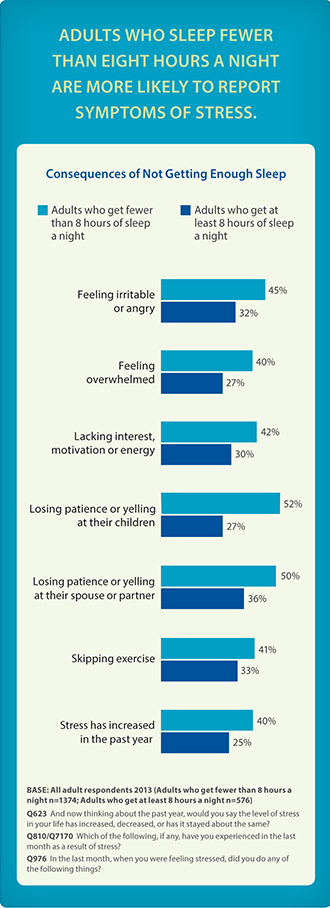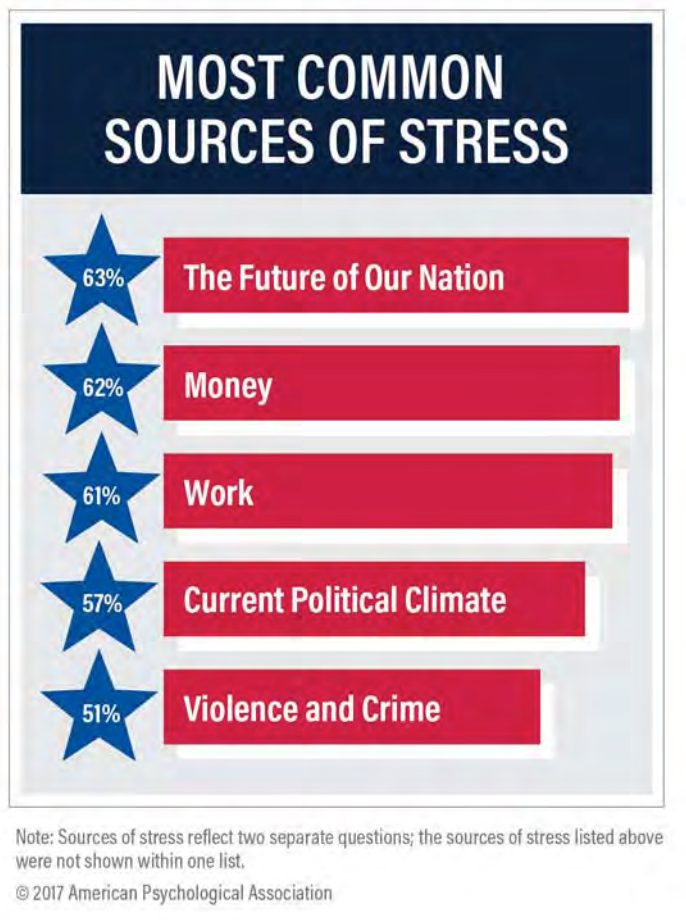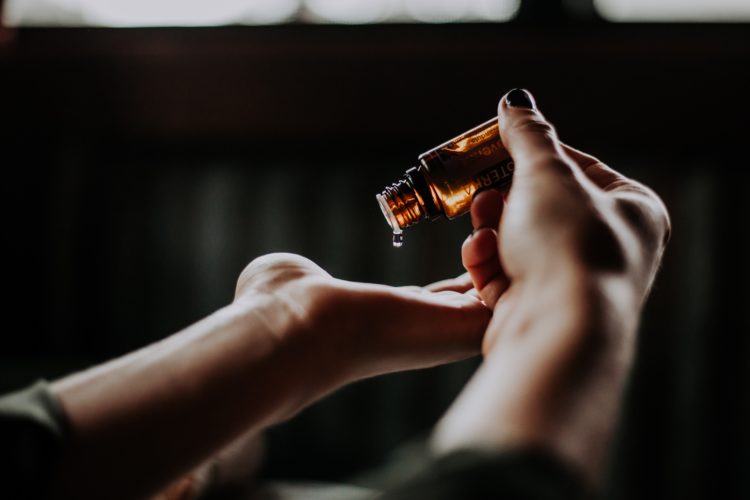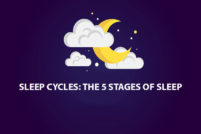The National Center on Sleep Disorders Research estimates that approximately 40 million Americans have some kind of sleep disorder. This encompasses a wide range of illnesses and conditions that include insomnia, sleep apnoea and restless leg syndrome.
Sleep-related disorders are on the rise and many illnesses that people are suffering from during the day, may be connected to poor sleep, at night.
Depression, weight gain and high blood pressure are just a few of the health issues that can be related to insufficient sleep and the connection between poor sleep and stress can be a cyclical one.
Too much stress can cause you to have a bad sleep, leading to mental and physical health issues which can, in turn, cause stress in daily life, leading to poor sleep at night.
Understanding how stress and sleep are connected is the path to getting a handle on the problem and learning how to manage stress during the day can only help improve your overall health and wellness and, hopefully, lead to better sleep, too.
Your body on stress – What exactly is stress and how does your body handle it?
 Stress is defined by the Oxford English Dictionary as “a state of mental or emotional strain or tension resulting from adverse or demanding circumstances.”
Stress is defined by the Oxford English Dictionary as “a state of mental or emotional strain or tension resulting from adverse or demanding circumstances.”
In short, it is the way by which your body experiences and manages external pressures, whether they are mental or physical.
A normal level of stress can actually be good for the body and can motivate you to work harder, focus and even improve performance.
But, this is only the case when the cause of the stress is short term. Too much stress can have the opposite effect and lead to chronic health problems. To understand why, it is important to know how exactly your body responds to stress on a physiological level.
Normally, when faced with a situation of stress, your nervous system causes your body to release stress hormones, particularly cortisol, adrenaline and noradrenaline.
This is part of what is known as the “fight or flight” response in the body and it’s the system that gets you ready to fight or flee your challenge or dangerous situation. These hormones subside once the external threat is removed and the body begins to relax again.
But, when you are under stress continuously, this aggravation to the nervous system doesn’t subside and it can have a devastating effect on your overall health.
Incessant stress causes your blood pressure to be continuously raised, putting a strain on your heart and circulatory system. Breathing is affected, heartbeat becomes rapid and you might be in a near constant state of holding your breath or hyperventilation.
With long term stress, muscles are continuously tense, which might cause headaches and neck strain and continued, heightened levels of cortisol can cause weight gain and inflammation in the body, leading to a suppressed immune system.
Digestion is also affected, as raised cortisol levels cause you to crave and eat more fatty foods, as it helps your body prepare for a dangerous and threatening situation and you might start to suffer from heartburn and acid reflux, as your stomach produces more acid during times of stress.
Your endocrine system, regulated by the brain, is also affected. This can have an effect on everything from mood and tissue health to blood sugar metabolism and reproduction.
It’s no wonder you can’t sleep when your stress levels are raised, as your body is in an ever-ready fight mode on a physiological level, ready to tackle whatever danger is coming your way.
5 Ways in Which Stress Affects Your Body
- Endocrine system – Stress causes the adrenal gland to release epinephrine, or adrenaline and norepinephrine, or noradrenaline, into the body, which helps your body respond to danger by increasing heart rate, constricting blood vessels and converting fat to energy. Your body also releases cortisol during stress, which has many damaging effects on the body when unregulated. The increase in hormones causes the liver to produce more glucose and strains the body’s ability to reabsorb the sugar, causing diabetes. Even more frightening, an Australian study showed that chronic stress increases the rate and volume at which lymphatic vessels drain cancerous tumours, helping them to spread throughout the body.
- Respiratory system – Stress can cause increased and shallow breathing or holding of your breath, meaning that cells don’t get enough oxygen. This can lead to dizziness, lack of concentration and you could even temporarily lose consciousness.
- Circulatory system – When you are under stress, your heart beats faster, working to pump blood quickly around your body to get it ready for action. Blood pressure is raised and when under stress and it can be raised for too long, causing long-term problems for the body.
- Digestive system – Heartburn, acid reflux, ulcers and esophageal spasms are all health issues that can be tied to stress in the body, as your body produces more acid and controls what nutrients you absorb during times of high stress. This can also cause constipation and diarrhoea.
- Musculoskeletal system – During times of high stress, muscles are constantly tightened, leading to pain, injury and chronic issues like migraines and tension headaches.
5 Top Causes of Stress

The American Psychological Association conducts an annual “Stress in America” survey, in which they determine how stressed Americans feel and what exactly keeps them up at night.
Released in November 2017, the most recent poll shows the most common sources of stress are as seen in this infographic.
While this report showed that American’s stress levels in 2017 were at levels consistent to those in 2016, nearly half (46 percent) of Americans polled reported that lying awake at night in the past night was one outcome of their stress levels.
This is a marked increase from 2016, when 40 percent of Americans reported sleeplessness due to their stress levels.
Further to this, 34 percent of people polled reported that they felt fatigue due to their stress.
How stress keeps you awake at night – The vicious cycle of bad sleep and stress
There are many ways in which the above mentioned physiological changes can make for a poor sleep. Heightened adrenaline levels and increased heart rate can cause tossing and turning and a feeling of restlessness.
When your body is experiencing chronic stress, it thinks it’s in a state of perpetual danger and that it shouldn’t be sleeping! You might be able to fall asleep but not stay asleep and you might wake up frequently in the night.
You might find it hard to calm your thoughts and lay awake at night, worrying about your finances, relationship, work or whatever else is bothering you.
Overwork or being too busy during the day can also lead to stress and leave yourself with not enough time to get a good sleep. If you find yourself with not enough hours to sleep, you might not fall asleep easily when you finally do go, because you are overstimulated and overworked.
With no time to wind down at the end of your day, your body forgets which is rest time and which is time for action.
Not enough time and too much stress in your day might also mean that you don’t have enough time to exercise, make time for friends and family or do otherwise relaxing and healthy activities that relieve stress, leading to a poor sleep at night.
After a bad sleep, you might need more caffeine to stay awake, causing a vicious cycle in which you can’t get to sleep at night, because you’ve had too much caffeine. These are just a few of the ways in which stress can keep you up or ruin the quality of your sleep.
How to Lower Stress Levels to Improve Sleep
While there are a few chronic sleep conditions that may require medical intervention, like sleep apnoea and insomnia, if your sleep loss is due to stress, there are some things you can do to help yourself. Check out some of these tips and tricks to relieving stress and incorporate a few of them into your daily life, to see if you notice any difference in sleep quality.
Increase your exposure to daylight

If you work inside a dark office during the day or live in the northern hemisphere, you might not be getting enough daylight and your sleep might be affected.
Studies have shown that exposure to sunlight or bright indoor lights during the morning hours helps people sleep better at night.Adequate daylight is also shown to decrease depression and stress.
Help calibrate your circadian rhythm by making sure you get lots of daylight and if you can’t, consider investing in a light therapy device to keep near you, during the day.
Exercise

Make sure you are giving yourself time to exercise during the day. Exercise is considered by health professionals as one of the best ways to maintain mental health and reduce stress.
The Anxiety and Depression Association of America says that “when stress affects the brain, with its many nerve connections, the rest of the body feels the impact, as well.
So, it stands to reason that if your body feels better, so does your mind.” Exercise releases endorphins into the body that not only make you happy but help reduces stress and improve sleep.
Try some natural relaxation and wellness techniques

Meditation, yoga and other relaxation techniques have all proved effective for stress and sleep disorders. There are plenty of guided meditations and yoga routines geared specifically to those with problems sleeping.
Take some time out of your busy day to wind down at the end of it.Even if you have only 10 minutes for a short meditation before you go to bed, you may see a positive result.
You don’t need any special skills or to follow any religious dogma, so give it a try. No time? Fall asleep to music or nature sounds geared especially for deep sleep. Here are a few of our favourites:
Try aromatherapy

You might find that incorporating some aromatherapy into your life can help you sleep. One 2017 study showed that patients in intensive care that could not sleep well had an increased quality of sleep and reduced level of anxiety by using lavender oil.
There are many different ways to use essential oils to help you relax and sleep, including air diffusers and pillow sprays. Lavender and camomile are two popular essential oils with relaxing properties.
Have a bath before bed with a few drops of lavender or sleep with an air diffuser on near the bed, to both moisturize the air and infuse it with a relaxing aroma.
Make your room a den of zen

Give yourself a chance to relax and calm down before bed. Never bring your work to bed and invest in a good bed with linens in calming colours, like white and grey. Keep your room clear of clutter and other stressors and keep your tablets and other devices out of the bedroom. Establish a relaxing night time routine that starts at least an hour before you try to hit the pillow.
Try journaling

You might be able to relieve some stress by journaling before bed. The University of Rochester Medical Center says that journaling can help you manage overwhelming emotion and anxiety, reduce stress and cope with depression.
It does this by helping you prioritize your problems, fears and concerns as you work out the issues that are causing you stress and can also be used as a tool to track your day to day stressors and triggers, so you can learn better ways to control them.
Sort out your finances

65 percent of Americans lie awake due to money issues. Sometimes easier said than done, sorting out your finances can be a good way to reducing your stress and helping you to get a good night’s sleep.
While it might not always be easy to reduce financial stress, you might be having trouble sleeping because you havebeen avoiding your financial problems and, because they don’t just “disappear”, they will haunt you, at night.
By looking at your finances honestly, consolidating debt and coming up with an actionable plan, you can slowly work to make positive changes and reduce your financial stress. (5 strategies to Deal with Financial Stress) .
Look to supplements

Before turning to sleeping pills, consider supplements and herbal remedies to help you sleep. While all supplements should be taken under the guidance of a physician, melatonin, tryptophan, B12 and magnesium are some of the useful ones that might help you, as well as herbal teas that contain valerian, passionflower and camomile.
Adjust your diet

Apart from making sure you get enough exercise, a healthy, balanced diet is an important part of the stress/sleep equation. Lower your caffeine consumption by the afternoon, so that you aren’t keeping yourself awake.
Don’t eat too close to bedtime and make sure your diet isn’t too heavy in sugar and carbohydrates, which can wreak havoc on your blood sugar and energy levels. Give your body a chance to fast in the evening and cut out late night snacking.
Seek professional help
![]()
If nothing seems to work and you’ve tried all of the above, you might do well with the help of a sleep specialist. If you have eliminated the possibility of a medical condition, such as apnoea, a sleep specialist can try to determine why you aren’t sleeping and what to do about it.
Sleep clinics can monitor your breathing and heart rate when you are sleeping, to make sure that you don’t have a medical problem and to determine if it is stress related, or something else.
Take charge of your wellness and look into how stress might be affecting your sleep and how lack of sleep is affecting your stress levels! A serious matter, high levels of stress can have lasting consequences on your health and wellness and lead to life threatening diseases and bigger problems than just being tired.
By learning about what is happening inside your body during times of stress, you can better understand how to change or modify your environment and routines and gain some control of your body, inside and out. And, by employing just one or two of the above techniques to manage stress, you might notice a big change in your mental and physical health and sleep quality.





